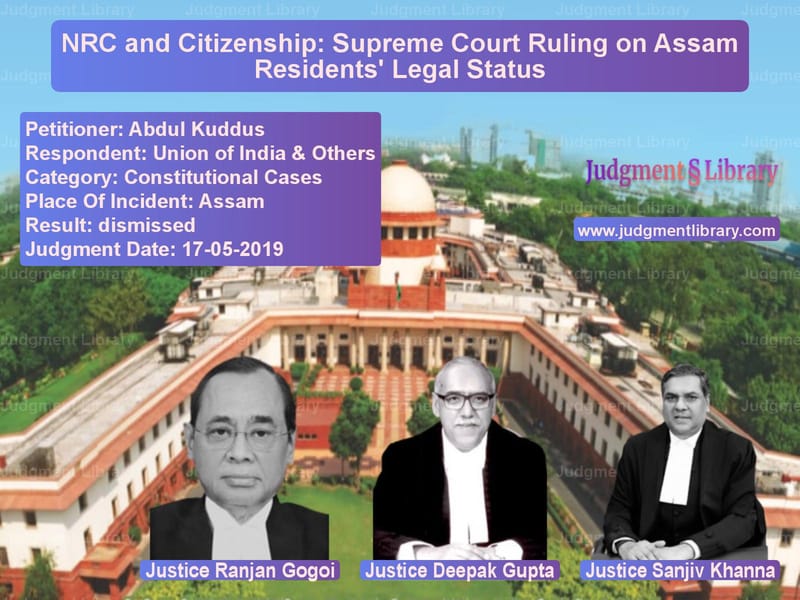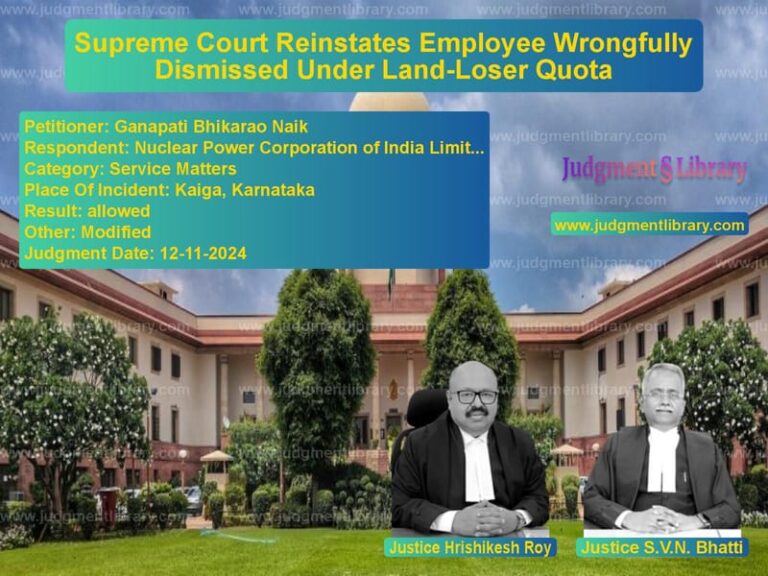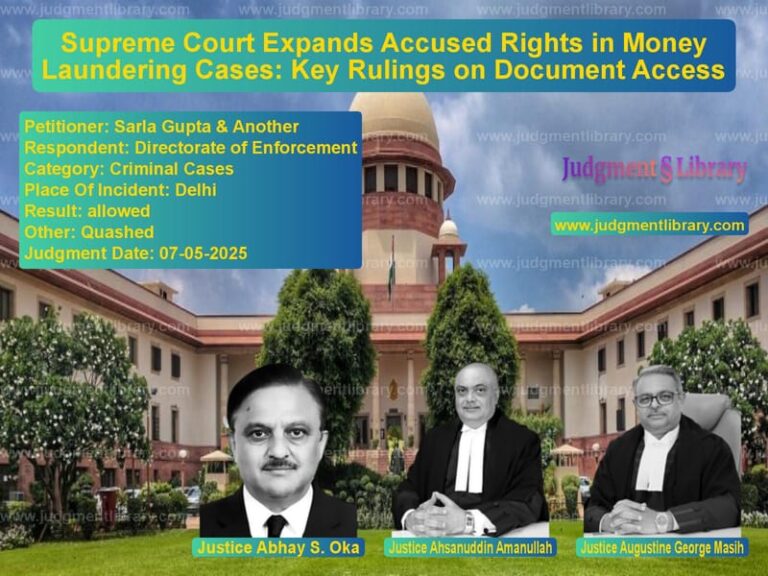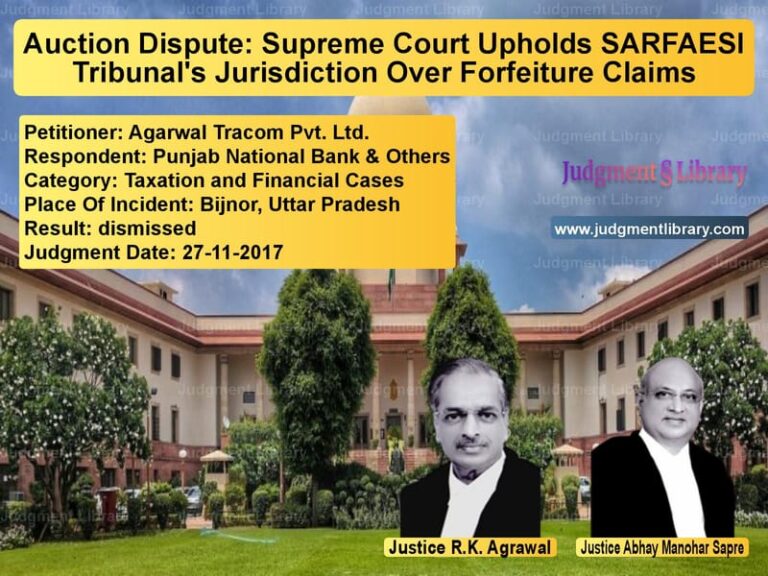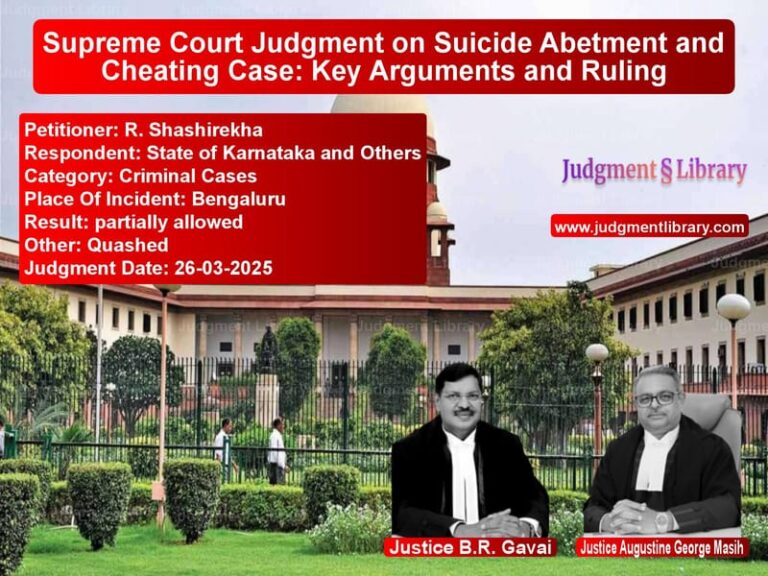NRC and Citizenship: Supreme Court Ruling on Assam Residents’ Legal Status
The case of Abdul Kuddus vs. Union of India & Others is a landmark decision that has shaped the legal framework surrounding the determination of citizenship in Assam. The case arose from disputes regarding the inclusion and exclusion of individuals in the National Register of Citizens (NRC) and the role of the Foreigners Tribunal in determining citizenship. The Supreme Court was called upon to resolve whether a person declared as a foreigner by the Tribunal could appeal through the NRC mechanism or whether the Tribunal’s decision was final and binding.
The judgment clarified the procedural and substantive rights of individuals contesting their citizenship status and emphasized the supremacy of the Foreigners Tribunal in such matters. The ruling has significant implications for thousands of individuals affected by the NRC process in Assam.
Background of the Case
The NRC was implemented in Assam as part of an effort to identify illegal immigrants and distinguish them from legitimate Indian citizens. This process involved extensive verification of documents and testimonies to establish one’s nationality. However, complications arose when individuals found themselves excluded from the NRC due to prior declarations by the Foreigners Tribunal.
Several appellants, including Abdul Kuddus, challenged their exclusion from the NRC, arguing that they had the right to appeal under NRC provisions despite earlier adverse findings by the Foreigners Tribunal. Their legal representatives contended that the Tribunal’s findings should not preclude them from establishing their citizenship under a separate administrative process.
The central question before the Supreme Court was whether the Tribunal’s ruling could be reopened in the NRC appeal process or if it constituted a final adjudication on the matter.
Legal Issues Considered
- Whether individuals declared as foreigners by the Tribunal could seek redress under NRC appeals.
- Whether the Tribunal’s decision was an administrative order or a final judicial ruling.
- Whether inconsistencies in NRC exclusions and inclusions warranted a separate reconsideration of citizenship status.
Petitioner’s (Abdul Kuddus & Others) Arguments
- The Foreigners Tribunal’s findings should not be treated as final judicial decisions but as administrative orders open to review.
- Many cases involved family members, where some were included in the NRC while others were excluded, leading to inconsistencies.
- The NRC process is distinct from the Foreigners Tribunal proceedings and should allow a fresh determination of citizenship.
- The burden of proof required in the Foreigners Tribunal was excessively strict, making it difficult for genuine citizens to establish their nationality.
- Article 21 of the Constitution guarantees the right to life and dignity, which includes protection against arbitrary deprivation of citizenship.
Respondent’s (Union of India) Arguments
- The Foreigners Tribunal operates under the Foreigners Act, and its findings are legally binding.
- The NRC process cannot be used to circumvent or relitigate issues already decided by the Tribunal.
- Allowing a separate NRC appeal for individuals already declared foreigners would create a parallel adjudicatory system, leading to contradictions and legal confusion.
- The Government has already provided mechanisms for judicial review through High Court and Supreme Court interventions.
- The principles of res judicata apply, meaning a final decision by a competent authority cannot be reopened in another forum.
Supreme Court’s Observations
The Supreme Court analyzed the provisions of the Citizenship Act, the Foreigners Tribunal Order, and the NRC rules. It noted that citizenship determination by the Foreigners Tribunal is not merely an administrative exercise but a quasi-judicial process with binding legal consequences.
The Court emphasized:
“The opinion of the Foreigners Tribunal is a quasi-judicial order that determines the nationality status of an individual. It cannot be re-adjudicated through NRC appeals.”
The Court also addressed concerns about family members having contradictory statuses, stating that each individual’s case is assessed separately based on the available evidence.
Referring to the Foreigners Tribunal’s process, the Court observed:
“The Tribunal functions with the procedural safeguards necessary for a fair trial, including notice, opportunity to be heard, and reasoned decisions. Thus, its findings must be respected and cannot be reopened through NRC appeals.”
The judgment further clarified that while individuals had the right to challenge Tribunal decisions, the appropriate remedy was to file a writ petition in the High Court or Supreme Court, rather than seek reconsideration through NRC mechanisms.
Key Findings of the Supreme Court
- Decisions of the Foreigners Tribunal are final and binding unless overturned through judicial review.
- The NRC process cannot override or reopen foreigner declarations made by the Tribunal.
- Family members’ inclusion in NRC does not automatically grant citizenship to relatives who have been declared foreigners.
- The principles of res judicata apply, preventing relitigation of citizenship claims already adjudicated.
- Persons excluded from NRC due to Tribunal findings must challenge their status through judicial appeals rather than administrative reconsideration.
Final Verdict
The Supreme Court ruled that individuals declared as foreigners by the Tribunal could not seek redress through NRC appeals. It upheld the principle that Tribunal decisions carry legal sanctity and must be challenged through judicial mechanisms rather than NRC proceedings.
The judgment dismissed the petition and directed that any challenge to foreigner declarations must be pursued through established legal avenues such as High Court and Supreme Court writ petitions.
Implications of the Judgment
This ruling has far-reaching consequences for individuals excluded from the NRC due to foreigner declarations. It reinforces the binding nature of Tribunal decisions and prevents the NRC from being used as a forum for re-litigating citizenship claims.
The judgment also clarifies the procedural safeguards available to individuals, ensuring that they have the right to challenge adverse decisions through judicial review rather than administrative appeals.
Overall, this ruling strengthens the legal framework governing citizenship determination in Assam and provides clarity on the relationship between NRC and Foreigners Tribunal findings.
Petitioner Name: Abdul Kuddus.Respondent Name: Union of India & Others.Judgment By: Justice Ranjan Gogoi, Justice Deepak Gupta, Justice Sanjiv Khanna.Place Of Incident: Assam.Judgment Date: 17-05-2019.
Don’t miss out on the full details! Download the complete judgment in PDF format below and gain valuable insights instantly!
Download Judgment: Abdul Kuddus vs Union of India & Oth Supreme Court of India Judgment Dated 17-05-2019.pdf
Direct Downlaod Judgment: Direct downlaod this Judgment
See all petitions in Fundamental Rights
See all petitions in Public Interest Litigation
See all petitions in Constitution Interpretation
See all petitions in Judgment by Ranjan Gogoi
See all petitions in Judgment by Deepak Gupta
See all petitions in Judgment by Sanjiv Khanna
See all petitions in dismissed
See all petitions in supreme court of India judgments May 2019
See all petitions in 2019 judgments
See all posts in Constitutional Cases Category
See all allowed petitions in Constitutional Cases Category
See all Dismissed petitions in Constitutional Cases Category
See all partially allowed petitions in Constitutional Cases Category

